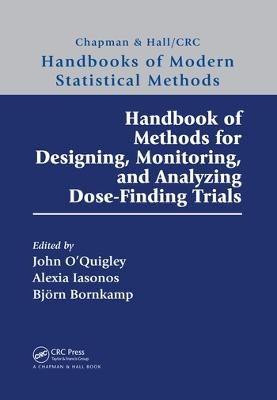
Handbook of Methods for Designing, Monitoring, and Analyzing Dose-Finding Trials
Chapman & Hall/CRC (Verlag)
978-0-367-33068-2 (ISBN)
Handbook of Methods for Designing, Monitoring, and Analyzing Dose-Finding Trials gives a thorough presentation of state-of-the-art methods for early phase clinical trials. The methodology of clinical trials has advanced greatly over the last 20 years and, arguably, nowhere greater than that of early phase studies. The need to accelerate drug development in a rapidly evolving context of targeted therapies, immunotherapy, combination treatments and complex group structures has provided the stimulus to these advances. Typically, we deal with very small samples, sequential methods that need to be efficient, while, at the same time adhering to ethical principles due to the involvement of human subjects.
Statistical inference is difficult since the standard techniques of maximum likelihood do not usually apply as a result of model misspecification and parameter estimates lying on the boundary of the parameter space. Bayesian methods play an important part in overcoming these difficulties, but nonetheless, require special consideration in this particular context. The purpose of this handbook is to provide an expanded summary of the field as it stands and also, through discussion, provide insights into the thinking of leaders in the field as to the potential developments of the years ahead. With this goal in mind we present:
An introduction to the field for graduate students and novices
A basis for more established researchers from which to build
A collection of material for an advanced course in early phase clinical trials
A comprehensive guide to available methodology for practicing statisticians on the design and analysis of dose-finding experiments
An extensive guide for the multiple comparison and modeling (MCP-Mod) dose-finding approach, adaptive two-stage designs for dose finding, as well as dose–time–response models and multiple testing in the context of confirmatory dose-finding studies.
John O’Quigley is a professor of mathematics and research director at the French National Institute for Health and Medical Research based at the Faculty of Mathematics, University Pierre and Marie Curie in Paris, France. He is author of Proportional Hazards Regression and has published extensively in the field of dose finding.
Alexia Iasonos is an associate attending biostatistician at the Memorial Sloan Kettering Cancer Center in New York. She has over one hundred publications in the leading statistical and clinical journals on the methodology and design of early phase clinical trials. Dr. Iasonos has wide experience in the actual implementation of model based early phase trials and has given courses in scientific meetings internationally.
Björn Bornkamp is a statistical methodologist at Novartis in Basel, Switzerland, researching and implementing dose-finding designs in Phase II clinical trials. He is one of the co-developers of the MCP-Mod methodology for dose finding and main author of the DoseFinding R package. He has published numerous papers on dose finding, nonlinear models and Bayesian statistics, and in 2013 won the Royal Statistical Society award for statistical excellence in the pharmaceutical industry.
O'Quigley, John; Iasonos, Alexia; Bornkamp, Björn
Part I. Introduction to the objectives of Phase I studies and endpoints. Overview of Phase I designs. Model based designs when safety is the primary aim. Using non binary endpoints. Dose expansion cohorts. Part II. Safety and Efficacy: bivariate endpoints. Combination studies. Studies with multiple schedules. Studies in the presence of patient heterogeneity. Pediatrics. Parameterization: model complexity and optimal designs. Part III. Dose-Finding Trials in Phase II-Overview and Objectives. Analysis of Confirmatory Dose-Finding Studies. Design of dose-finding trials: Doses, allocation weights and sample size. The MCP-Mod methodology: Practical Considerations and the DoseFinding R package. Two-stage designs for dose-finding studies. Longitudinal approaches for dose-response modelling. Regulatory Viewpoint on Dose-Finding Studies. Part IV. Introduction to Pharmacometrics: Exposure Response Modeling. Pharmacokinetic Data Structure. Pharmacokinetic Compartment Modeling. Approximate Likelihood Approaches for Pharmacometrics. Population Pharmacokinetics. Pharmacodynamic Models Bayesian Approaches for Pharmacometric Modeling. Pharmacometrics Modeling Examples.
| Erscheinungsdatum | 19.06.2019 |
|---|---|
| Reihe/Serie | Chapman & Hall/CRC Handbooks of Modern Statistical Methods |
| Zusatzinfo | 30 Illustrations, black and white |
| Sprache | englisch |
| Maße | 178 x 254 mm |
| Gewicht | 562 g |
| Themenwelt | Mathematik / Informatik ► Mathematik |
| Medizin / Pharmazie ► Medizinische Fachgebiete ► Pharmakologie / Pharmakotherapie | |
| Studium ► Querschnittsbereiche ► Epidemiologie / Med. Biometrie | |
| Naturwissenschaften ► Biologie | |
| Technik | |
| ISBN-10 | 0-367-33068-7 / 0367330687 |
| ISBN-13 | 978-0-367-33068-2 / 9780367330682 |
| Zustand | Neuware |
| Informationen gemäß Produktsicherheitsverordnung (GPSR) | |
| Haben Sie eine Frage zum Produkt? |
aus dem Bereich


